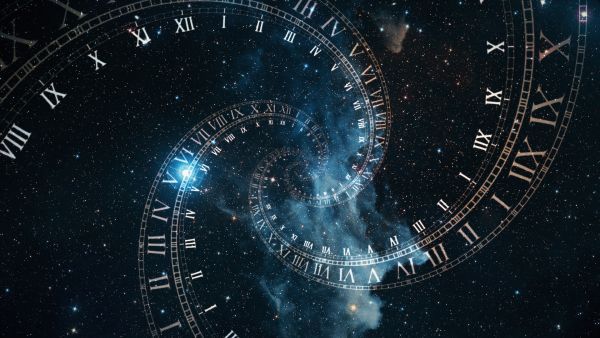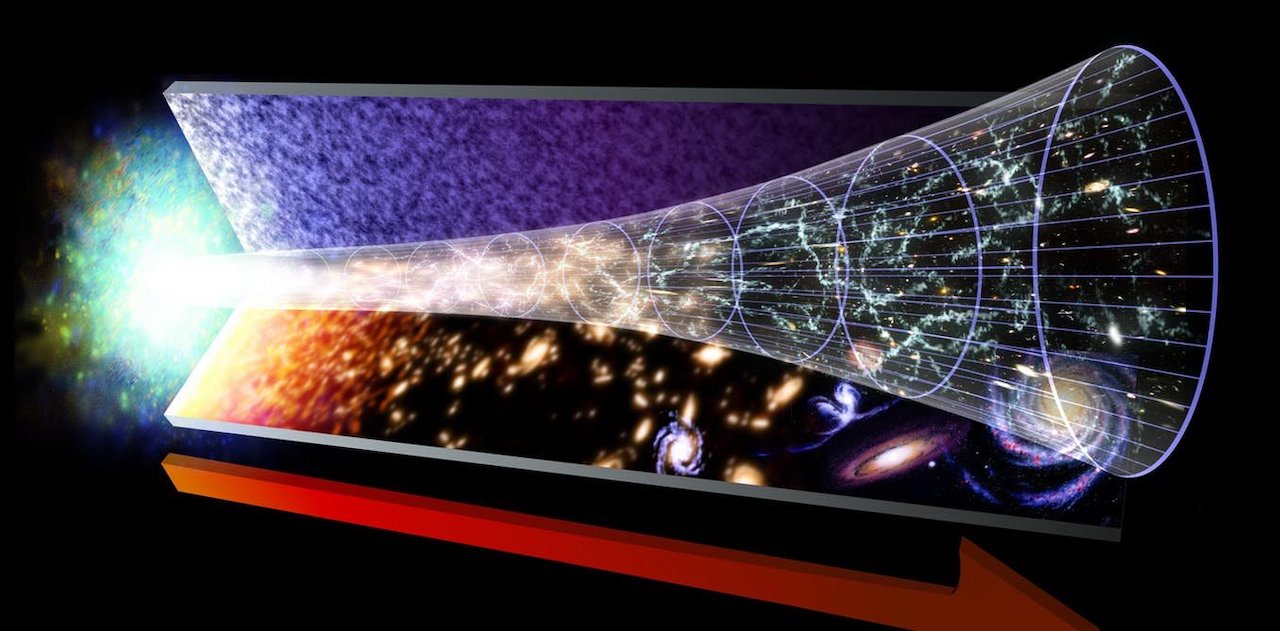What is time?
Time is one of the few things we regard as regular and unchanging. But is it really so constant? We take a look at the physics of time.

Get the world’s most fascinating discoveries delivered straight to your inbox.
You are now subscribed
Your newsletter sign-up was successful
Want to add more newsletters?
Join the club
Get full access to premium articles, exclusive features and a growing list of member rewards.
Time is the apparent progression of events from past to future. While it's impossible to completely define the nature of time, we all share many common experiences bound by time: Causes lead naturally to effects, we remember the past but not the future and the evolution of time appears to be continuous and irreversible.
Is time relative?
Einstein's theory of special relativity revealed that the experience of the flow of time is relative to the observer and their situation. Previously, the work of Isaac Newton had assumed the existence of a "master clock" that kept synchronized time throughout the universe. This clock wasn't really thought to exist, but the concept allowed Newton's equations to work. The key idea was that all observers could agree on the exact same moment of time, according to the Internet Encyclopedia of Philosophy.
However, building on work before him, Einstein discovered that the passage of time is relative. In special relativity, moving clocks run slowly; the faster you move in space, the more slowly you progress through time. The closer you get to the speed of light, the greater this effect becomes.

In the decades since Einstein first proposed this concept, physicists have made multiple measurements that demonstrate this effect. An atomic clock aboard a jet airplane will tick at a slower rate than one on the ground. A subatomic particle called a muon doesn't exist long enough to travel from the atmosphere, where it's generated when cosmic rays strike air molecules, to the ground. But because muons travel at close to the speed of light, they seem to exist longer from our perspective, allowing them to complete their journey.
When Einstein developed his theory of general relativity, he extended this concept, known as "time dilation," to situations involving gravity. The presence of strong gravity also slows the passage of time, so a clock in a strong gravitational well (for example, on the surface of Earth or near a black hole) will tick at a slower rate than a clock in the middle of space, according to physicist Christopher S. Baird.
Related: 9 ways you can see Einstein's theory of relativity in real life
Is time travel possible?
Time travel into the future isn't just permitted — it's mandatory. Indeed, with every passing second, all of us are moving forward into our own futures. The future is unavoidable, and it is impossible to escape. But the reality of relativity makes it clear that "jumping" forward in time is perfectly acceptable.
Get the world’s most fascinating discoveries delivered straight to your inbox.
If a twin sets off in a rocket ship and spends a few years traveling near the speed of light, when they return to Earth, they will have aged less than their Earthbound twin. Although only a few years may have passed on the spaceship, decades or even centuries could have passed on Earth, depending on how quickly the rocket traveled, according to Cosmos magazine. In a real-life example, NASA astronaut Scott Kelly has experienced a few milliseconds less time than his twin Mark (Scott is also six minutes younger), thanks to spending a longer time in space, traveling at speeds of around 17,500 mph (28,100 km/h), according to Live Science sister site Space.com.

But time travel into the past appears to be forbidden – at least in all experiments and observations ever done. For one, the possibility raises all sorts of uncomfortable issues, like the famous grandfather paradox which asks what would happen if you went back in time and killed your own grandfather: You wouldn't exist, so you wouldn't be able to travel back in time to commit the act.
Second, there is no known mechanism in physics that permits traveling backward in time. While certain time-traveling situations can be constructed in general relativity, those situations require entities that don't seem to exist in our universe (like matter with negative mass, or infinitely long cylinders).
However, physicists currently do not have a full understanding of why time travel into the past is forbidden.
Can time be reversed?
Almost all laws and equations that physicists use to understand the natural world are symmetrical in time. That means they can be reversed without changing any results. For example, if you were to watch a video of a ball rising into the air and falling again, without any other context, you wouldn't be able to tell if the video was being played forward or in reverse.
However, there is one aspect of physics that does seem to respect a flow of time: the concept of entropy, which is a measure of the disorder in a system. According to the second law of thermodynamics, entropy always rises in a closed system, and this evolution can't be reversed.
Physicists don't know if the growth of entropy gives rise to the "arrow" of time or if it's just a coincidence, according to the Stanford Encyclopedia of Philosophy.

Is time discrete or continuous?
Almost all physical theories treat time as a continuum, which is also how we perceive the flow of time. There is no smallest "unit" of the passage of time. All events flow smoothly without interruption or hiccups into the next.
However, one theory of quantum gravity, called loop quantum gravity, hypothesizes the existence of a smallest possible unit of space-time. This unit would represent the smallest possible extension of space and duration of time. In this theory, what we perceive as smooth, continuous time is really a stuttering, stop-motion progression from past to future. But because this happens for such an incredibly brief duration, it appears to be continuous, like the frames of a movie blending together, according to a 1998 article by physicist Carlo Rovelli in the journal Living Reviews of Relativity.
Is time real?
Scientists, philosophers and others have pondered the nature of time. And although we've learned a lot about time, such as the reality of time dilation and the possible connection between time and entropy, we haven't been able to come up with a complete description of what time is.
Some philosophers and physicists have argued that what we experience as time is just an illusion, an artifact of our consciousness. In this view, the passage of time isn't real; the past and future already exist in their complete extent, the same way the entirety of space already exists. What we sense as the flow of time is a byproduct of the way our brains work as we process sensory information from our environment, according to physicist Sean Carroll.
Additional resources
- Listen to the venerable "Astronomy Cast" podcast to explore how to skip forward through time in this episode.
- Article author and astrophysicist Paul M. Sutter explored the nature of time travel in this episode of his "Ask a Spaceman" podcast.
- The time-reversal symmetry is fundamental to physics, and you can learn more about it in this recorded lecture provided by the International Centre for Theoretical Physics.
Bibliography
Baird, C. S. (2013, June 24). Does time go faster at the top of a building compared to the bottom? Science Questions with Surprising Answers. https://www.wtamu.edu/~cbaird/sq/2013/06/24/does-time-go-faster-at-the-top-of-a-building-compared-to-the-bottom/
Callender, C. (2021, June 8). Thermodynamic asymmetry in time. Stanford Encyclopedia of Philosophy. https://plato.stanford.edu/entries/time-thermo/
Carroll, S. (2013, October 18). Is time real? https://www.preposterousuniverse.com/blog/2013/10/18/is-time-real/
Hunter, J. (n.d.). Time travel. Internet Encyclopedia of Philosophy. Retrieved April 5, 2022, from https://iep.utm.edu/timetrav/
O'Connell, C. (2021, August 3). Time travel: five ways that we could do it. Cosmos. https://cosmosmagazine.com/science/physics/five-ways-to-travel-through-time/
Rovelli, C. (1998). Loop quantum gravity. Living Reviews in Relativity, 1(1). https://link.springer.com/article/10.12942/lrr-2008-5

Paul M. Sutter is a research professor in astrophysics at SUNY Stony Brook University and the Flatiron Institute in New York City. He regularly appears on TV and podcasts, including "Ask a Spaceman." He is the author of two books, "Your Place in the Universe" and "How to Die in Space," and is a regular contributor to Space.com, Live Science, and more. Paul received his PhD in Physics from the University of Illinois at Urbana-Champaign in 2011, and spent three years at the Paris Institute of Astrophysics, followed by a research fellowship in Trieste, Italy.
 Live Science Plus
Live Science Plus










